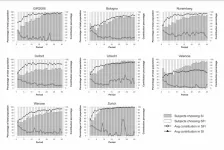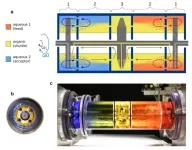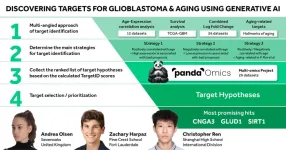(Press-News.org) A popular explanation for climate denialism is that humans will adopt beliefs that accord with their political orientation, using their cognitive abilities to explain away identity-inconsistent information in a process called “motivated reasoning.” To test this hypothesis, Bence Bago and colleagues challenged volunteers’ ability to think rationally using time pressure and cognitive loads of varying intensity. The team recruited American participants from Lucid, a website that connects academics with online survey participant pools. The authors found that people who had the ability to deliberate free of cognitive load or time restrictions showed greater coherence between their judgments about climate change and their prior beliefs about climate change. Controlling for this effect, there was no significant residual relationship between partisan identity and judgement. For example, Republicans who believe in climate change were significantly more likely to disagree with arguments against the reality of climate change when they had adequate time to deliberate than when they were rushed and had divided attention. Evaluating new evidence as more reliable if it accords with prior beliefs is sometimes called “confirmation bias,” but such reasoning can also be entirely rational from a Bayesian perspective: Broadly speaking, previously established facts are likely to be true and new contradictory information from an uncertain source is likely to be false. The authors conclude that instead of trying to decouple discussion of climate change from politics, those who wish to communicate about the issue should primarily focus on providing accurate information.
END
Climate reasoning, prior beliefs, and partisanship
2023-05-02
ELSE PRESS RELEASES FROM THIS DATE:
SwRI, UTSA researchers develop new method to synthesize antimalarial drug
2023-05-02
SAN ANTONIO – May 2, 2023 - Southwest Research Institute (SwRI) and The University of Texas at San Antonio (UTSA) have developed a method to synthesize the highly potent antimalarial drug artemisinin, which could lead to a more cost-effective treatment for malaria. The work, recently featured on the cover of the scientific journal Organic Letters, was supported by the Bill and Melinda Gates Foundation as well as a grant from the Connecting through Research Partnerships (Connect) program, a joint effort by SwRI and UTSA to enhance scientific collaboration between the two institutions.
In 2021, 247 million cases of malaria led to 619,000 deaths worldwide. The most effective ...
ASBMB calls for better wages and benefits for postdocs
2023-05-02
The American Society for Biochemistry and Molecular Biology sent recommendations to the National Institutes of Health on April 14 to improve working conditions for postdocs.
The society recommended that the NIH:
Ensure a livable wage, benefits, etc. for postdocs
Require that principle investigators help postdocs craft a training plan
Require that principal investigators complete mentor training programs
Expand programs to create more academic staff scientist positions
Collect data on postdoc career outcomes
“Many of our members who run labs are struggling to recruit and retain qualified postdocs,” Sarina Neote, public affairs director ...
Cooperation benefits from peer-punishment
2023-05-02
A multi-lab replication of a 2006 study supports the role of peer sanction in promoting human cooperation. Cooperation is imperative for society to successfully solve complex problems, including climate change. One approach many groups have adopted is a system of peer sanctions for noncooperators. Such a system incurs costs to participants, who must impose the sanctions, but can allow cooperators to feel more secure that their investments in the shared project will be matched by others. A 2006 study suggested that groups with peer sanctions outgrew and outperformed groups without a peer-sanctioning institution. In light ...
Recycling of valuable metals from spent lithium ion batteries using spinning reactors
2023-05-02
In a world that is slowly distancing itself from carbon-based energy, there has been a meteoric rise in the use of lithium-ion batteries as a next-generation energy storage solution. However, this has resulted in another problem - an increase in the amount of lithium battery waste. Lithium-ion batteries degrade slowly over their lifetime, losing anywhere from 12% to 24% of their total capacity over 500 charging and discharging cycles. The electrolyte and other materials inside the battery can also degrade, causing a decrease in capacity over time. The disposal of lithium batteries ...
PCORI offers up to $452 million through new health research funding opportunities on high-priority topics
2023-05-02
WASHINGTON, D.C. – The Patient-Centered Outcomes Research Institute (PCORI) today began inviting proposals for new studies and implementation projects through nine funding opportunities. These PCORI Funding Announcements (PFAs) include four offering up to $452 million for comparative clinical effectiveness research (CER) studies comparing health care approaches to help patients and their caregivers make better-informed health choices given their particular circumstances. Additional PFAs offer funding for a range of projects that support and advance patient-centered CER and use of PCORI-funded research results.
“With ...
Could wearables capture well-being?
2023-05-02
New York, NY (May 2, 2023)—Applying machine learning models, a type of artificial intelligence (AI), to data collected passively from wearable devices can identify a patient’s degree of resilience and well-being, according to investigators at the Icahn School of Medicine at Mount Sinai in New York.
The findings, reported in the May 2nd issue of JAMIA Open, support wearable devices, such as the Apple Watch®, as a way to monitor and assess psychological states remotely without requiring the completion of mental health questionnaires.
The ...
High school student researchers find new brain tumor drug targets using AI
2023-05-02
Three high school students – Andrea Olsen from Oslo, Norway; Zachary Harpaz from Boca Raton, Florida; and Chris Ren from Shanghai, China – co-authored a paper using a generative artificial intelligence (AI) engine for target discovery from Insilico Medicine (“Insilico”) called PandaOmics to identify new therapeutic targets for glioblastoma multiforme (GBM). GBM is the most aggressive and common malignant brain tumor, accounting for 16% of all primary brain tumors. The findings were published on April 26 in the journal Aging.
Olsen, a student at Sevenoaks School in Kent, UK, began interning at Insilico Medicine in 2021, after discovering ...
More than 5,000 tons of toxic chemicals released from consumer products every year inside homes and workplaces
2023-05-02
People often assume that the products they use every day are safe. Now a new study by Silent Spring Institute and University of California, Berkeley exposes how much people come into contact with toxic ingredients in products, used at home and at work, that could harm their health. Findings from the analysis could help state and federal agencies strengthen chemical regulations and guide manufacturers in making safer products.
Many common products like shampoos, body lotions, cleaners, mothballs, and paint removers contain toxic volatile organic compounds or VOCs—chemicals that escape as gases, accumulate in indoor air, and cause a variety of health ...
Researchers discover that the ice cap is teeming with microorganisms
2023-05-02
There are no plants, and only very few animals: people rarely come here. The large glaciers in Greenland have long been perceived as ice deserts. Gigantic ice sheets where conditions for life are extremely harsh.
But now, it seems, we have been wrong. There is much more life on the glaciers than we thought.
Headed by Professor Alexandre Anesio, a group of researchers from the Department of Environmental Science at Aarhus University have discovered that the glaciers are teeming with life. Microbes that have adapted to ...
Behavior patterns of people who achieve clinically significant weight loss
2023-05-02
COLUMBUS, Ohio – A new study analyzing data on over 20,000 U.S. adults links a healthier diet and increased exercise to weight loss that reduces heart disease risk – while associating skipping meals and taking prescription diet pills with minimal weight loss, weight maintenance or weight gain.
For many in the study sample, however, losing a “clinically significant” 5% of their body weight did not eliminate their risk factors for cardiovascular disease, results showed. In fact, the average ...






